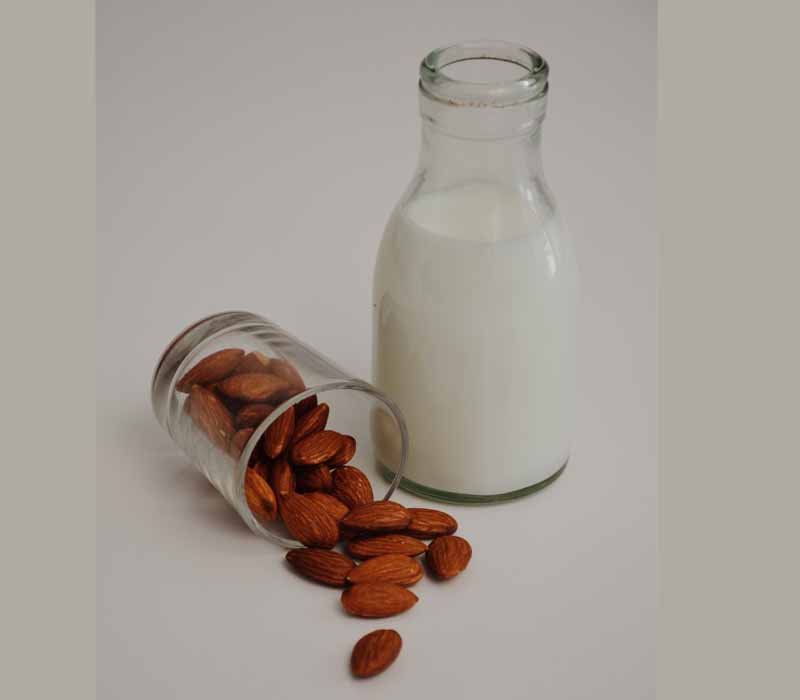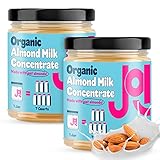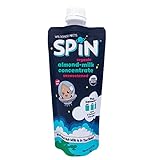Are you vegan or vegetarian? Organic almond milk is indeed a dairy-free and animal-free milk substitute. It is adaptable and may be used in a range of dishes, such as baking, cooking, and as a lactose creamer.
Page Contents
Introduction: What is Organic Almond Milk?
A dairy-free, plant-based milk substitute produced from whole or almonds and water is known as organic almond milk. In order to get a smooth and creamy drink, the almonds are normally steeped in water, mixed, and then filtered. Because it has fewer calories, saturated fat, and cholesterol than cow’s milk, It is seen as a healthier option. It also contains a lot of vitamins and minerals, such calcium, magnesium, and vitamin E. In addition to being lactose-free, it is a good choice for those who are lactose intolerant or allergic to milk. In recipes for coffee, tea, and baking, it frequently replaces cow’s milk.
Benefits of Organic Almond Milk
It has a number of advantages, including:
- Reduced in calories: It has less caloric intake than milk from cows, making it a good option for dieters
- It is indeed a dairy-free replacement to milk from cows, making it an excellent choice for individuals who seem to be lactose intolerant or allergic to milk
- It is high in minerals such as vitamins And minerals, magnesium, and calcium, all of which are crucial for bone health and general well-being
- It is packed with saturated fat, a type of form of fat that really can raise your cardiovascular disease danger
- It is easy to digest, making it an excellent alternative for persons with digestive disorders
- It is a versatile ingredient that may be used to replace cow’s milk in a range of applications, including smoothies, baking, and cooking
- It is a more environmentally friendly alternative to cow’s milk since it uses fewer water and resources to manufacture
Overall, organic almond milk is a healthy and pleasant substitute for cow’s milk that can deliver a variety of health advantages.

Nutritional Content of Organic Almond Milk
The nutritional composition of organic almond milk varies based on the brand and any added components. Nevertheless, one cup (240 mL) of unsweetened organic almond milk includes roughly:
- Calories: 30-40
- Fat: 2.5-3 grams
- Saturated fat: 0 grams
- Carbohydrates: 1-2 grams
- Fiber: 1 gram
- Sugar: 0 grams
- Protein: 1 gram
- Calcium: 20-45% of the Daily Value (DV)
- Vitamin D: 25% of the DV
- Vitamin E: 50% of the DV
- Magnesium: 15-20% of the DV
- Potassium: 1% of the DV
It’s crucial to remember that sweetened organic almond milk may have more calories and sugar, so read the nutrition label before ingesting. Also, while organic almond milk is a fantastic source of calcium, it may not supply as much protein as cow’s milk, so if you rely on almond milk as your major source of protein, you need add other protein-rich items in your diet.
Production
The following steps are commonly included in the manufacturing of organic almond milk:
- Raw, whole, or almonds are soaked in water for many hours, or overnight. This softens the almonds and removes any bitter flavour
- After soaking the almonds, they are drained and mixed with new water. The almond-to-water ratio may be adjusted to get the desired consistency and creaminess of the milk
- The combined mixture is then strained through a fine mesh strainer or cheesecloth to remove any almond pulp or grit. The finished product is smooth and creamy, with a somewhat nutty flavour
- Packaging and storage: The almond milk is then placed in a container and refrigerated for up to 5 days. Organic almond milk may also be frozen and used later
While creating almond milk at home is quite straightforward, it may be time-consuming and the use of a powerful blender. Organic almond milk, on the other hand, is commonly accessible in grocery shops and online sellers. When purchasing it, study the ingredient list and opt for brands that are organic to verify that pesticides and other dangerous chemicals are not present.
How to Choose The Best Organic Almond Milk
There are various variables to consider while selecting the best organic almond milk:
- Seek for organic almond milk with a limited ingredient list, ideally just almonds and water. Products with additional sugars, preservatives, or artificial tastes should be avoided
- Nutritional value: Check the nutrition label to make sure the almond milk has a low calorie, sugar, and saturated fat content. Look for calcium, vitamin D, and other important nutrient-fortified products
- Select organic almond milk from known brands that value sustainability, ethical sourcing, and transparency. Investigate the brand’s manufacturing methods and certifications, such as USDA Organic and Non-GMO Project Verified
- Taste and texture are subjective, so it’s vital to experiment with numerous brands to discover the one that best matches your preferences. Certain types are thicker and creamier than others, while others have a more mild almond flavour
- Price: The cost of organic almond milk varies based on the brand, size, and region. Compare costs to locate a product that meets your needs without sacrificing quality
You may select the best organic almond milk that suits your nutritional needs, taste preferences, and budget by taking these aspects into account.

Some Ideas Using Organic Almond Milk
It may be utilised in a wide range of recipes, both sweet and savoury. Here are a few recipes to try:
- Almond milk smoothie: For a nutritious and satisfying breakfast or snack, combine 1 cup organic almond milk, a banana, a handful of berries, and a scoop of protein powder
- Cook macaroni according to package directions for vegan mac and cheese. In a separate skillet, heat 1 tablespoon olive oil and 1 tablespoon flour until bubbling over medium heat. Stir with 1 cup organic almond milk and 1/2 cup nutritional yeast until smooth. Season with salt and pepper, then pour the sauce over the macaroni and toss to incorporate
- To make a creamy vegetable soup, sauté chopped onions and cloves of garlic in olive oil until transparent. Cook until the veggies of your choice (carrots, celery, and broccoli) are soft. Cook until the veggies are extremely mushy, then add 4 cups of organic vegetable broth and 1 cup of organic almond milk. Puree the soup in a blender or with a blender until smooth
These are just a few suggestions to get you started; the possibilities are limitless! It may be used in practically every recipe that calls for cow’s milk, from baked goods to savoury sauces.
Comparison With Other Types of Milk
It is only one of several non-dairy milk substitutes on the market. Here’s how almond milk compares to other common varieties of milk:
- Cow’s milk: Cow’s milk contains protein, potassium, and vitamin D. Nevertheless, it can be heavy in saturated fat as well as lactose, making it inappropriate for persons who are lactose intolerant or allergic to dairy
- Soy milk: A strong source of protein, soy milk provides all of the necessary amino acids. It also contains a lot of calcium, vitamin D, and some other vital elements. Unfortunately, some individuals are sensitive to soy, and it has a strong flavour that is not for everyone
- Oat milk is high in fibre and beta-glucans, which can help decrease cholesterol levels. It also has a mellow, creamy taste reminiscent to cow’s milk. Nevertheless, certain brands may be rich in added sugars, so read the label carefully
- It contains fewer calories, fat, and sugar than other varieties of milk. It is also lactose and cholesterol free, making it an excellent choice for anyone with dietary allergies. Furthermore, it has a nutty flavour and a creamy texture that may be used in place of cow’s milk in a variety of recipes
Conclusion
It is appropriate for you based on your nutritional needs and preferences. It may be an excellent option if you are lactose intolerant or allergic to dairy, or if you want a low-calorie, low-fat alternative to cow’s milk. Furthermore, if you are worried about sustainability and ethical sourcing, opting for organic almond milk from a respected brand might be a smart way to support responsible agricultural methods.
Nevertheless, if you are allergic to nuts or detest the flavour of almonds, It may not be the ideal option for you. It is critical to listen to your body and select a milk substitute that satisfies your nutritional demands as well as your taste preferences.
Overall, It may be a nutritious and tasty addition to your diet, offering key nutrients and a creamy texture without the downsides of cow’s milk. You may get the benefits of this healthy and adaptable milk replacement by selecting high-quality, and including it into a well-balanced diet.
We have more related questions
- Almond Milk Banana Smoothie – The Best Treat For You
- What Does Almond Milk Taste Like Best Information
- 1 Cup Almond Milk Calories: The Best Information For You
- Organic Cream Cheese And Its Best Recipes For You
- Are Sesame Seeds Gluten-Free?
FAQs
Yes, it can be used in cooking and baking as a substitute for cow’s milk. It may alter the taste and texture of some recipes, so it is important to experiment and adjust accordingly.
Yes, it is typically more expensive than regular almond milk, as it is produced using organic almonds that are grown without the use of synthetic fertilizers, pesticides, or other harmful chemicals. However, the health and environmental benefits may be worth the extra cost for some consumers.
It typically lasts for 5-7 days in the refrigerator after opening. It is important to check the expiration date on the package and to use the milk before it spoils.











